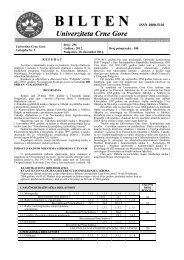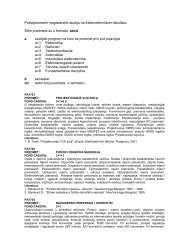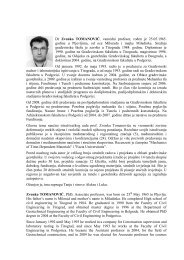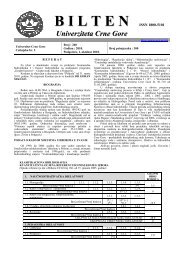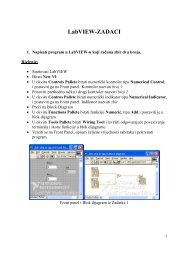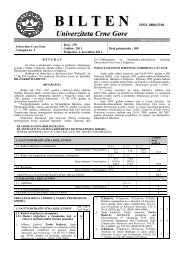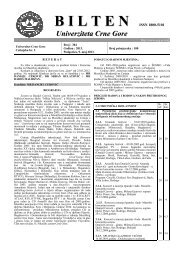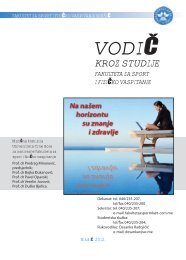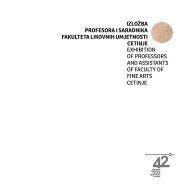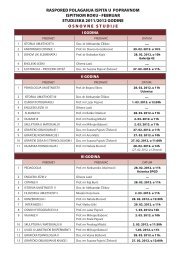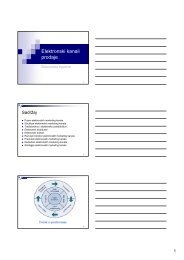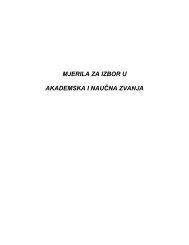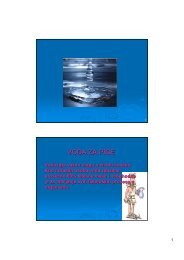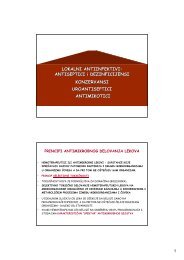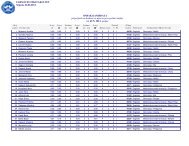WHO monographs on selected medicinal plants - travolekar.ru
WHO monographs on selected medicinal plants - travolekar.ru
WHO monographs on selected medicinal plants - travolekar.ru
You also want an ePaper? Increase the reach of your titles
YUMPU automatically turns print PDFs into web optimized ePapers that Google loves.
<str<strong>on</strong>g>WHO</str<strong>on</strong>g> <str<strong>on</strong>g>m<strong>on</strong>ographs</str<strong>on</strong>g> <strong>on</strong> <strong>selected</strong> <strong>medicinal</strong> <strong>plants</strong><br />
purpose of the study was to detect a decrease in the Ki-67 proliferative<br />
index during the late follicular phase after a 3-m<strong>on</strong>th course of 50.0 mg/<br />
day red clover isoflav<strong>on</strong>es. The biopsies were timed as close as possible to<br />
days 7–11 of the menst<strong>ru</strong>al cycle, and simultaneous measurements of<br />
trans-vaginal endometrial thickness, uterine artery Doppler, horm<strong>on</strong>e<br />
profiles, lipids and b<strong>on</strong>e markers were made. Of 30 women, two did not<br />
return for a sec<strong>on</strong>d biopsy, and a third had an unsuccessful sec<strong>on</strong>d biopsy.<br />
Four subjects were excluded from the intenti<strong>on</strong>-to-treat analysis because<br />
they did not have menst<strong>ru</strong>al bleeding within the time frame of the study<br />
(3 subjects) or were tested <strong>on</strong> day 13 instead of between days 7 and 11 of<br />
the cycle (1 subject). There was no change in the Ki-67 proliferati<strong>on</strong> index<br />
after treatment in either group. Eight women in the group given the<br />
placebo and eight in the treatment group had proliferative endometrial<br />
biopsies that were synchr<strong>on</strong>ized with estradiol levels at baseline and<br />
post-treatment, and analysis of these subjects revealed no detectable change<br />
in the relati<strong>on</strong>ship between estradiol levels and Ki-67 with treatment in<br />
either group. There was no change in fasting lipids, b<strong>on</strong>e markers, uterine<br />
Doppler resistance or pulsatility index (33).<br />
Effects <strong>on</strong> b<strong>on</strong>e and cardiovascular system<br />
Six trials have assessed the effects of isoflav<strong>on</strong>es <strong>on</strong> total cholesterol and<br />
lipid levels (27, 34–38). A randomized, single-blind, cross-over study involving<br />
21 premenopausal women with regular menst<strong>ru</strong>al cycles assessed<br />
the effect of an extract of the c<strong>ru</strong>de d<strong>ru</strong>g <strong>on</strong> plasma lipids and oxidizati<strong>on</strong><br />
of low-density lipoprotein cholesterol (34). Subjects were treated with a<br />
placebo or 86 mg of isoflav<strong>on</strong>es per day for two menst<strong>ru</strong>al cycles, after<br />
which they were crossed over to the other group. Fourteen women completed<br />
the study and no differences in total cholesterol, triglycerides or<br />
oxidized low-density lipoprotein were observed.<br />
A randomized, double-blind, placebo-c<strong>on</strong>trolled study involving<br />
66 postmenopausal women with hypercholesterolaemia assessed the effects<br />
of an ascending dose of the extract, 40 or 80 mg of isoflav<strong>on</strong>es, <strong>on</strong><br />
lipid profiles (35). Study participants were asked to follow a low isoflav<strong>on</strong>e<br />
diet for 3 m<strong>on</strong>ths during the study. Treatment did not affect total<br />
cholesterol, low-density lipoprotein, high-density lipoprotein cholesterol<br />
or plasma triglycerides at any dose.<br />
A double-blind placebo-c<strong>on</strong>trolled trial compared the effects of two<br />
doses of isoflav<strong>on</strong>es, 40 and 80 mg, with the effects of a placebo <strong>on</strong> arterial<br />
compliance and plasma lipids in menopausal women. After a 3–4-<br />
week <strong>ru</strong>n-in period and a 5-week placebo phase, 26 women were randomly<br />
allocated to receive either 40 mg of the extract or the placebo for<br />
an additi<strong>on</strong>al 5 weeks, and then the dose was increased to 80 mg. Sixteen<br />
344



